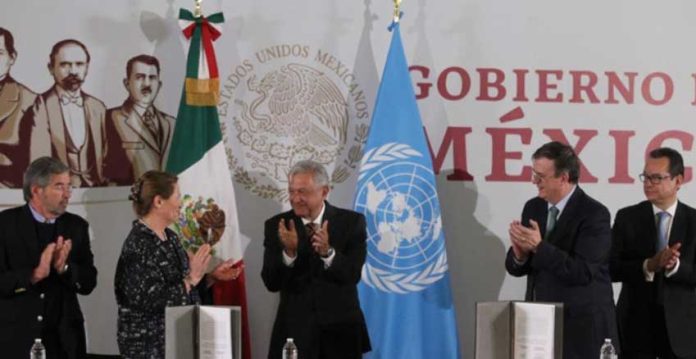The United Nations will provide Mexico with support in the administration of federal contracts and projects through an agreement signed yesterday.
The UN Office for Project Services (UNOPS) will provide supervision and tracking of federal contracts, projects and tenders as well as assistance with big projects such as the sale of government vehicles and aircraft, economic proposals for the Maya Train and the purchase of medications.
Juan Ramón de la Fuente, Mexico’s permanent ambassador to the UN, said that the move “will allow us to advance . . . and to once and for all lay to rest the culture of corruption in this country and to welcome a culture of transparency and laws in all of the government’s actions.”
He called corruption in Mexico “endemic” and said the signing of the accord was in response to President López Obrador’s repeated calls to make a philosophy of ethics a central pillar in the functioning of the federal government.
De la Fuente added that the agreement with the UNOPS would reinforce steps taken by Mexico to meet the goals of the United Nations’ 2030 agenda, an ambitious plan to stimulate concrete advances in global poverty, hunger, health, education, gender equality, energy, urbanization, environment and social justice.
“We are sure that the UN, working through its specialized offices, will help us to get to the root of many of the problems that afflict us that have been pointed out on numerous occasions by President López Obrador: to get to the bottom of poverty and inequality and to promote actions that have a direct social impact.”
The president thanked the ambassador, whom he described as “first-class,” and said that not only would UN supervision allow public administration to run more smoothly and ethically, it would also give government the opportunity to recover funds previously lost to widespread corruption.
UNOPS executive director Grete Faremo said the new partnership will give the Mexican government access to essential resources to fight corruption and implement better-planned projects and infrastructure.
“We are here because the Mexican government has asked for our help. We are grateful and humbly accept. Working together offers us an incredible opportunity to increase efficiency and to implement more effective projects,” she concluded.
Source: El Universal (sp), Excélsior (sp), Aristegui Noticias (sp)
